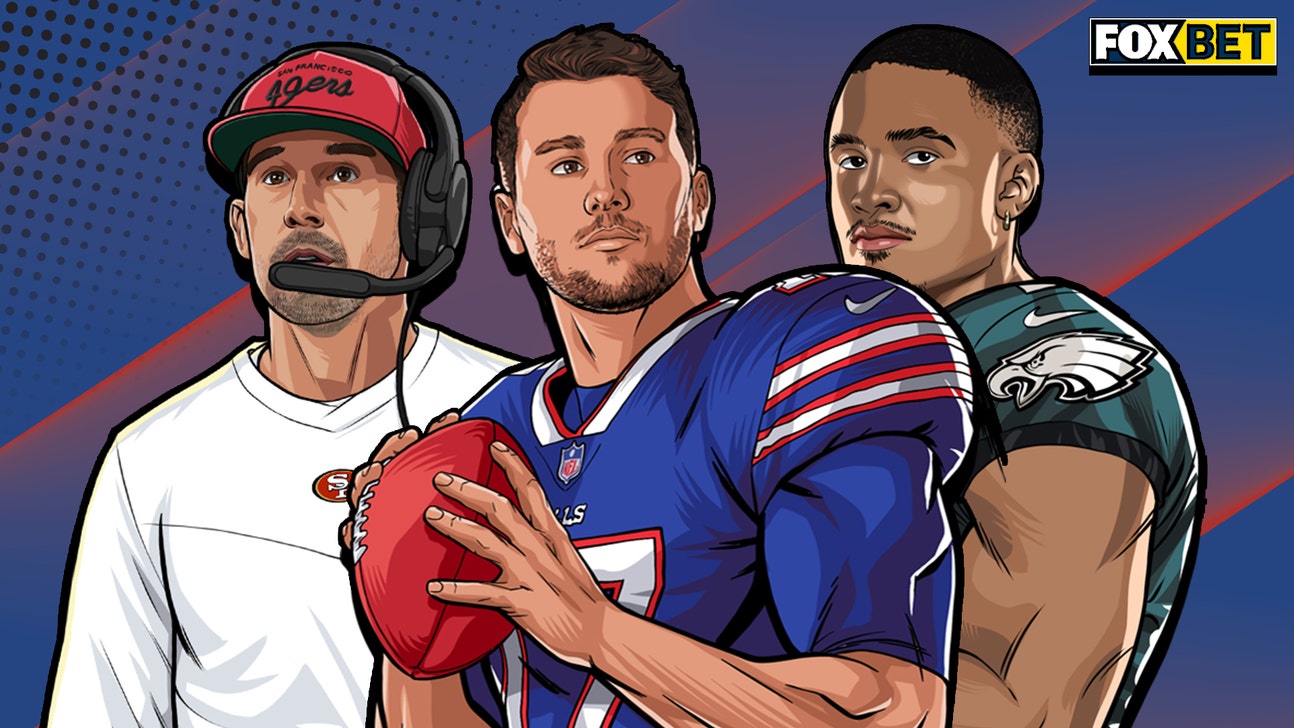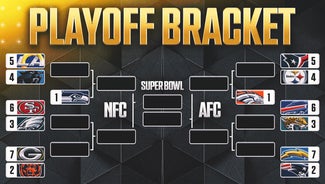
Inside Bills uneven offense; Eagles need healthy Hurts to thrive: Sharp Edges
Coaching Matters
Of the eight coaches advancing to the divisional round of the playoffs, seven are offensive-minded coaches.
The only one who was not coaching his offense prior to taking on a head coaching position was Sean McDermott, who coached defense. It is notable, however, that McDermott has come around the last several years and has been very much "hands-off" on the offensive side, to such a point that his Buffalo Bills team has become the NFL's No. 2 most pass-heavy team in neutral situations the last three years, something that is typically hard for defensive-minded coaches to allow.
Is there a benefit to having an offensive-minded head coach?
There certainly can be.
Offensive head coaches, especially former playcallers, tend to prioritize aggression and creativity on offense. They tend to realize their offense needs to win the game, rather than relying more on their defense to get the job done. They tend to tinker more on that side of the ball.
And we know that offensive success is more correlated with winning games than defensive success.
As a result, beyond simply having a good quarterback, it's vital to be aggressive and creative with the offensive scheme that he plays in. We've seen examples of the issues that the opposite behavior results in when looking at Justin Herbert's Chargers. Defensive-minded head coach Brandon Staley just fired their offensive coordinator Joe Lombardi because his offense wasn't aggressive nor creative enough. But Year 3 has come and gone for Justin Herbert and his rookie contract window and the Chargers are still without a single playoff win to show for it.
Offensive-minded head coaches tend to also be creative enough to offset short absence injuries from the most critical position in football, the quarterback.
Look at the incredible job that both Kyle Shanahan and Mike McCarthy did when losing their quarterbacks. Brock Purdy is undefeated still for the 49ers. When Dak Prescott went down, the offense was simplified for Cooper Rush, and he still went 4-1 as a starter for the Cowboys.
Lastly, if you hire a defensive head coach, he'll then hire an offensive coordinator. And if that OC is any good, he'll be gone in a couple of years. Meaning if you have great coaching and playcalling on the offense, it won't be there long, and there won't be sustained continuity for your quarterback.
Having an offensive-minded head coach doesn't guarantee you'll have success, nor does it correlate with making the playoffs or advancing to the divisional round.
But what we know is that these coaches who are still alive in the playoffs lead some of the best, most creative and most aggressive offensives in the NFL. And that is what wins games in the modern NFL.
An Uneven Bills Offense
Out of 12 quarterbacks to play in the wild-card round, Josh Allen ranked the worst on an EPA/play basis.
He averaged -0.26 EPA/pass.Typically, ranking so poorly when passing the ball will result in a loss.
Out of 12 quarterbacks to play this weekend, those ranking 5-11 all lost their game, with the exception of Trevor Lawrence (huge comeback) and Joe Burrow (who still produced a positive EPA of +0.05).
Even more concerning, this came against a Miami Dolphins defense that ranked 25th vs. the pass.
What went wrong?
For starters, Allen averaged 15.6 air yards per attempt. His average pass traveled nearly 16 yards downfield. Deeper passes are harder to complete. More incompletions. Potentially more interceptions.
A huge 54% of his pass attempts traveled 10-plus yards downfield, most in the NFL.
When playing with a lead, 58% of his passes traveled 10-plus yards downfield. No other playoff quarterback was above 36%.
Since 2010, there was not a single quarterback in the playoffs who threw the ball 20-plus yards downfield when playing with a lead more frequently than Josh Allen.
32% of his pass attempts when playing with a lead traveled 20-plus yards downfield.
Most of these passes were far too aggressive and delivered poor results. Look at Allen’s performance, when playing with a lead, based on target depth:
Throwing less than 10 yards downfield: +0.42 EPA/att, 75% success, 8.9 YPA on 8 attempts (6-of-8)
Throwing over 10 yards downfield: -0.54 EPA/att, 36% success, 7.9 YPA on 11 attempts (4-of-11)
Whether it is on Ken Dorsey or Josh Allen, the Bills need to know and understand better how to play when it matters in the NFL.
Taking shots down the field is a healthy and important part of this Bills offense.
No one remaining in these playoffs has an arm like Josh Allen. So, Buffalo must not ignore that. I always say "do something different and do it well" is one of the ways to differentiate your offense from the pack and make it harder to defend.
But if something isn’t working, you must recognize it and adjust. Buffalo was having a ton of efficiency attacking underneath, but they threw deep more than they threw short when playing with a lead, and those passes were extremely unsuccessful. Against the Cincinnati Bengals this weekend, Buffalo won’t be able to waste possessions coming up empty with deep incompletions and punting the ball back to Joe Burrow.
Staying aggressive and playing to win the game that you are leading is vital in the NFL. But if you’re being so aggressive that you’re stopping the clock after deep incompletions and punting the ball back to your opponent too frequently, it can cause problems.
In the second half, leading for the majority of the game, Buffalo punted the ball back to Miami 4 times.
They must do what it takes to score points, whether touchdowns or field goals, even if playing with a lead in the second half. Scoring points is always the goal of every possession save for the last one of the game. Buffalo must stay aggressive vs. the Bengals if they are fortunate to lead, but they need Josh Allen to do it more intelligently because it’s Joe Burrow on the other sideline, not Skylar Thompson.
Jalen Hurts' Injured Shoulder
Every season, there is a big injury that is discussed throughout the playoffs.
This year, it is Hurts’ injured shoulder. He initially hurt it nearly one month ago, on December 18th vs. the Bears. Two days later, head coach Nick Sirianni confirmed Hurts was dealing with a sprained shoulder and indicated it’s not something the Eagles expected to deal with "long-term."
Hurts missed the next two games, both losses by the Eagles, and returned for a must-win game vs. the Giants. It was a must-win because it was the only chance the Eagles had to secure a first-round bye. They won the game, but it wasn’t by a huge margin (22-16) over a Giants team that rested almost all their starters. And the Eagles didn’t come close to covering the 17-point spread.
But after the game, Sirianni said that Hurts was "hurting like hell."
Hurts said "it’s a good thing there’s a bye week", while Sirianni added "we are fortunate that we have two weeks until the next time we play" to echo his quarterback’s sentiments. "He came out of that game sore because it’s still healing. We didn’t feel like we were putting him at any more risk of getting more injured, but we knew it was going to hurt him like hell and he knew it was going to hurt him like hell. But that’s the kind of player he is, it’s the kind of teammate he is: He fought through it because it was important to him to be out there."
What did the performance look like on the field? Hurts went 20-of-35 for 229 yards and an interception. He ran the ball just nine times for 13 yards and either slid or ran out of bounds to avoid hits.
For this game, there was an element of doing just enough to win, but nothing more than that, because the playoffs were on the horizon. The Eagles knew the Giants were resting players.
So Philadelphia started off strong and built a 16-0 lead at halftime, before putting it into neutral and coasting to a narrow win which saw the Giants score 13 fourth-quarter points to make the game more respectable.
In the first three quarters, the Eagles punted just one time on eight drives.
In the first half, Hurts was 12-of-18 for 7.8 YPA.
The Eagles designed a very simplistic attack, averaging just 4.5 air yards per pass attempt on early downs.
It was Hurts’ lowest aDOT on early downs since Week 1. His prior three games averaged 12.1, 9.7 and 10.5 air yards per attempt on first-half early downs.
In the first three quarters, Hurts threw only 20% of pass attempts 10-plus yards downfield, his lowest rate since Week 1.
The good news for the Eagles is that when he did throw 10-plus yards downfield, Hurts averaged +0.72 EPA/att and had a 43% success rate. Three of the four incompletions were on account of overthrows, and on one, the receiver fell down in what could have been called pass interference but was not. Two of the three throws that were 30-plus yards downfield looked extremely well-placed and reasonably accurate.
The other good news? The Giants run defense is terrible. Last week in the playoffs, the Giants surrendered 2.9 yards before contact per rush to Vikings running backs. On early-down RB runs, the Giants allowed -0.02 EPA/att, which ranked 10th of 12 teams last week.
In the Week 14 meeting vs. the Eagles, the Giants allowed +0.40 EPA/att on early-down RB runs and surrendered 7.8 YPC on 21 rushes. Both were worst in the NFL that week. The Eagles won 48-22 and punted one time all game. They scored points in their first 6 drives, with the lone exception being a punt when they started the drive at their own 8-yard line.
For the Eagles to beat the Giants, they will need a healthy enough Jalen Hurts and an efficient run game.
The concern for Eagles backers is what happens when the Giants hit Hurts on his shoulder, and whether that knocks him out of the game. The potentially bigger concern, should they survive the Giants, is how healthy is Hurts for the NFC Conference Championship game without having the luxury of an extra week of rest between games. His shoulder injury is the single most critical injury on any team this postseason and it will be one to monitor on every snap Saturday night at 8:15 p.m. ET on FOX.
Warren Sharp is an NFL analyst for FOX Sports. He is the founder of Sharp Football Analysis and has worked as a consultant for league franchises while also previously contributing to ESPN and The Ringer, among other outlets. He studied engineering before using his statistical acumen to create predictive football models. You can follow Warren on Twitter at @SharpFootball.
Top stories from FOX Sports:
- Super Bowl LVII contenders re-ranked after wild-card round
- Cowboys' Dak Prescott comes up big vs. Bucs, but bigger challenge awaits
- Trevor Lawrence, Daniel Jones emerge; the secret of the 49ers' success
- NFL poll: Expert picks for MVP, DPOY, Super Bowl and other awards
- NFL mock draft: Alabama players go 1-2 as top 18 order is set
- Why you shouldn't bet against a Georgia three-peat next year
- Baseball Hall of Fame voting: Pedro Moura unveils his ballot
- LeBron James record tracker: How far is he from Kareem Abdul-Jabbar?
- How Pele brought the beautiful game to the United States
- NFL divisional round odds: Lines for every matchup










